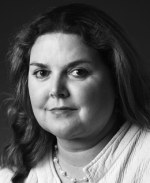
 Deirdre O’Donnell is an associate director of the Career Development Office (CDO).
Deirdre O’Donnell is an associate director of the Career Development Office (CDO).
Click here for Part I of this series.
For the investment banking industry, how important is prior experience vs. performance in interview vs. networking?
The job is going to go to the person who’s competent, can do the work, and wants it the most. How do they measure how badly you want it? Part of it is networking; part of it is having really meaningful conversations with multiple people at each institution. They definitely track which events you’ve been to so you want to be at all events. It’s a huge commitment of time. Most students will go down to New York to visit banks at least once so if you’re interviewing with eight banks, that’s a lot of trips to New York. (However, it is always important to remember that the quality of your interactions outweigh the quantity.)
There are a lot of people interviewing for a very small number of jobs so your initiative and passion really play a role. The ones who want it the most are the ones who are going to get it. If a particular bank is your number-one choice, tell them that in an interview because making that commitment in the interview may make the difference between you and somebody else getting the offer. (Obviously, integrity is everything and you can only tell one bank they are your top choice.)
For bulge bracket banks, prior experience is not critical. If you can get through the Tuck curriculum and perform well, they will be confident that you can do the job. The big investment banks have very robust training where they will teach you everything you need to know based upon your level of understanding once you get in there. Middle market investment banks also have training but their associate classes are smaller. It is different when you go to the boutique investment banks. Some have training programs which are usually small, and ideally they’re looking for somebody who already has a grasp of finance, preferably with previous investment banking experience. Boutique banks will often look at somebody who’s been at a bulge bracket bank for two years and hire them laterally.
Any other advice on how best to prepare for interviews in the investment banking industry?
There are a finite number of requirements to do well in an interview and we’ve recorded most of them. Trust what the previous Tuck students have put together in terms of questions asked and practice! Practice your technical questions—you have to do well on them to get to the final round—and practice doing fit interviews so you’re thoughtful around your core competencies. Show your commitment and passion for the business, network, and reach out to second-years and young Tuck alumni.
Finally, have a clear understanding of who the Tuck recruiting team is at each bank. You only have so much time at each bank, so you need to target the right people to spend time with.